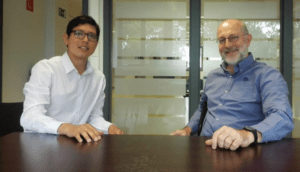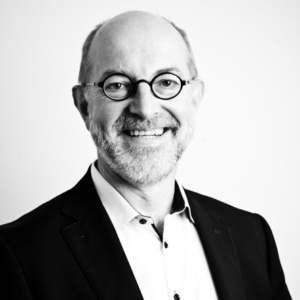Our September Immunologist of the Month is Dr. Pierre Van Damme. Dr Van Damme is a full professor at the University of Antwerp, Faculty of Medicine and Health Sciences. He chairs the Vaccine & Infectious Disease Institute (VAXINFECTIO, University of Antwerp), a consortium of four research units within the university: the Laboratory of Medical Microbiology (LMM), the Laboratory of Experimental Hematology (LEH), the Centre for the Evaluation of Vaccination (CEV) and the Centre for Health Economic Research and Infectious Disease Modelling (CHERMID). It is recognized as ‘Centre of Excellence’ of the University of Antwerp and functions as WHO Collaborating Centre for the WHO European Region for the control and prevention of infectious diseases. During the Vaccinology Summer School hosted by the CEV, University of Antwerp in Belgium, we had the opportunity of interview him and discuss his work and current projects, as well as what he considers a solution against vaccine hesitancy.
Name: Dr. Pierre Van Damme
Position: Professor at the University of Antwerp, Faculty of Medicine and Health Sciences
 Prof. Van Damme, big-word science comes only after a long pathway often characterized by a fundamental moment of curiosity or passion. When did it all begin for you? I started medical school with the idea to offer my knowledge to society. I was very much interested in working in developing countries. Now it’s very common but at that moment it was quite unique. I was one of the first students to go to the Democratic Republic of Congo for an internship which I liked tremendously. I was exposed to a lot of preventable and non-preventable infectious diseases. Coming back and after a couple of years gaining clinical experience, I decided to start working as a general practitioner in Antwerp not far away from the Institute of Tropical Medicine in 1987. During those years, HIV was seen as a terrible disease but there were lots of questions unanswered on sexually transmitted infections. I got at that moment the opportunity to do a civil service at the Tropical Institute instead of military duties, so that brought me closer to infectious diseases. I was always in contact with people like Peter Piot and Guido van der Groen (discoverers of the Ebola virus in 1976). So that was the very beginning I would say.
Prof. Van Damme, big-word science comes only after a long pathway often characterized by a fundamental moment of curiosity or passion. When did it all begin for you? I started medical school with the idea to offer my knowledge to society. I was very much interested in working in developing countries. Now it’s very common but at that moment it was quite unique. I was one of the first students to go to the Democratic Republic of Congo for an internship which I liked tremendously. I was exposed to a lot of preventable and non-preventable infectious diseases. Coming back and after a couple of years gaining clinical experience, I decided to start working as a general practitioner in Antwerp not far away from the Institute of Tropical Medicine in 1987. During those years, HIV was seen as a terrible disease but there were lots of questions unanswered on sexually transmitted infections. I got at that moment the opportunity to do a civil service at the Tropical Institute instead of military duties, so that brought me closer to infectious diseases. I was always in contact with people like Peter Piot and Guido van der Groen (discoverers of the Ebola virus in 1976). So that was the very beginning I would say.
How did your career in Vaccinology begin ?
The Centre for the Evaluation of Vaccination (CEV) is a multidisciplinary group, that conducts international scientific vaccine research such as phase 1-4 vaccine trials. What are the biggest challenges CEV faces? There are a number of challenges, in 2007-2008 we brought together all the expertise within our university related to infectious diseases, immunology, and vaccinology in one institute, respecting the independence of each research entity. I think that’s a very important challenge and at the same time an opportunity to work together with these experts. It is challenging learning how to work with each other, especially with individuals from different disciplines, it takes time. But the added value of working with each other is that one plus one is more than three. It creates new avenues, new ideas, and new research. You can say: “Okay, we have been looking at this” and the immunologist will say: “Oh, you know, in the meantime you can also look at different aspects of immunology, thus so we can go much further”.
The second challenge is doing vaccine trials. Doing trials, in general, remains a challenge because it’s much more demanding now than when I started in 1985 doing my first trial. I could do a trial with 700 subjects alone. Now it is no longer possible, and you would have a lot of issues related to recruitment of participants. What we see now is much more administrative and regulatory aspects that are needed to improve and guarantee the quality of the trial. This is great, but at the same time, it makes trials far less easier. Recruitment has become particularly difficult as well. People that volunteer for vaccine trials belong to a generation where there are a lot of other things to do and suffer from FOMO (fear of missing out). They say: “Oh, I have an appointment for a vaccine trial but I won’t show up because I have something else to do”. And that was not the case I would say five or ten years ago. So, it’s much more challenging to recruit and keep the population you need. We have had to be innovative and use social media and a lot of other ways to attract people for a vaccine trial.
What is currently the most exciting project that you are working on?
For more information on : the Polio Eradication Initiative; “Poliopolis”, an ambitious project to advance the eradication of polio( Youtube video in Dutch).
Is clear that all this dedication is compensated by breakthrough discoveries from your group that contributes directly to the advancement of knowledge. What would you say is your biggest contribution to science? There are many good vaccine trial centers in the world. We try to do our best on many different vaccine projects, but I would like to make a difference in educating students in vaccinology. If people say: “Oh, I remember something from the vaccinology courses of Prof. Van Damme”, I think I would prefer that. It would be more in the field of medical education that in the field of vaccine trials. Why? Because I’m convinced that healthcare providers do have a tremendously important role in not only giving the vaccine but also in talking about a vaccine, telling parents how important it is to vaccinate their children, and answering their questions. At the moment vaccine hesitancy is at highest in all continents, I think that the role of the healthcare provider will be increasingly important. I’m working on having much more attention in the medical curriculum for vaccinology education with a number of colleagues here in Europe. This is something that needs to happen because the whole vaccine hesitancy problem that exists among parents is understandable [somehow]. They rely on their doctors and their doctors cannot answer questions from them because they don’t know enough about vaccines. That’s exactly what we do not want. We need to work on the hesitancy of the healthcare providers before we can change the hesitancy among the parents. I think that having well-trained students, well-informed doctors, nurses, midwives, pharmacists and biomedical researchers will help to address this hesitancy problem.
You are proposing that education to healthcare providers and scientists could be the answer to the hesitancy phenomenon. What strategies are you developing for this cause?
Important links mentioned in the audio recording: LIVE Program; IDEAL Project; Vaccinology Summer School.
Why is vaccinology important in one sentence ?
Interview by Mario Alberto Ynga Durand











